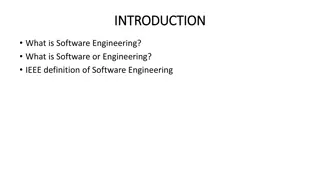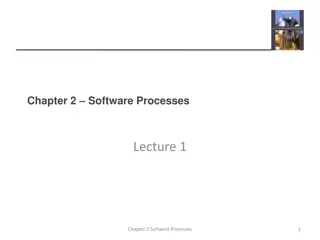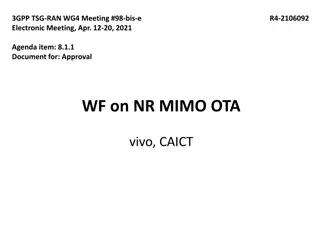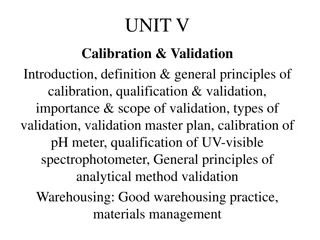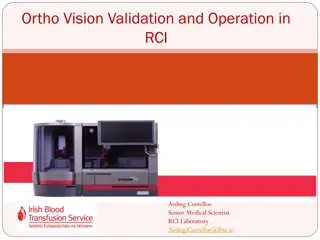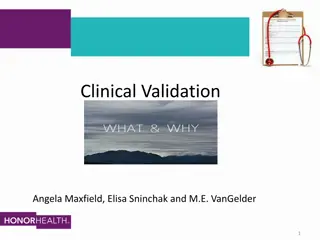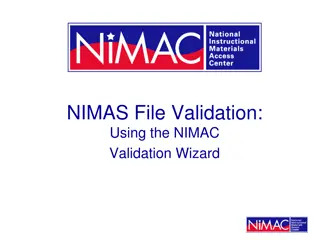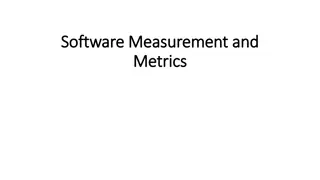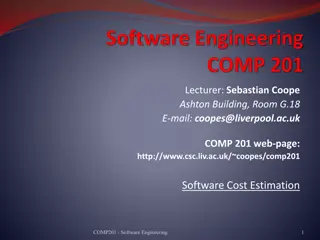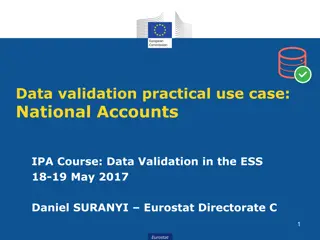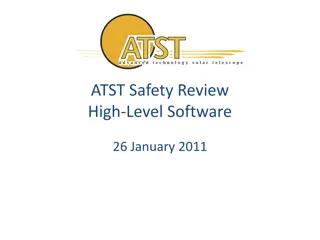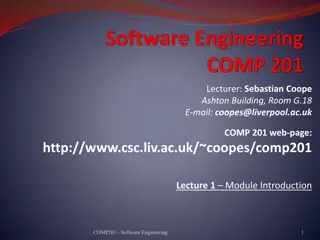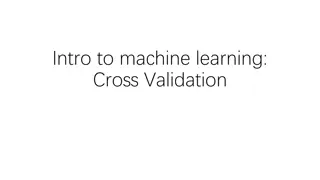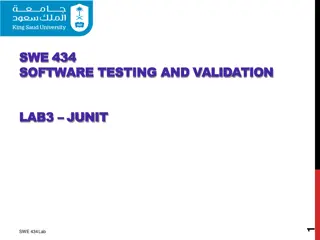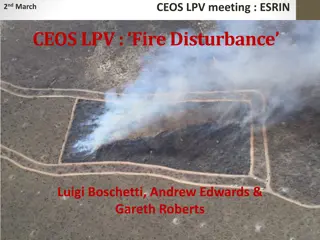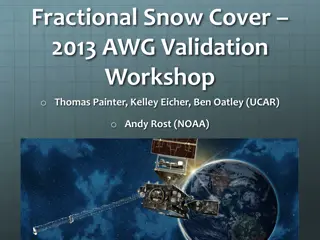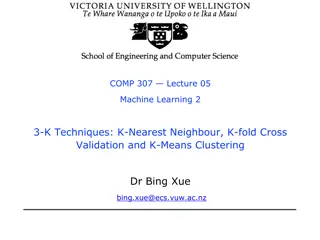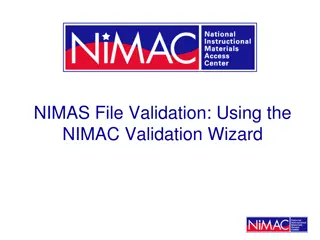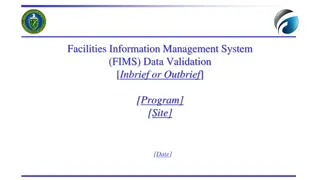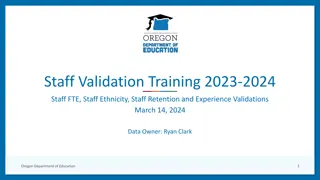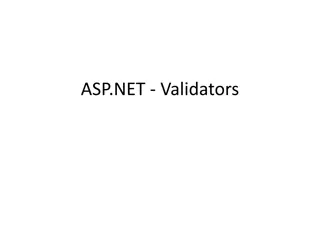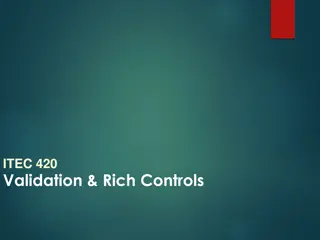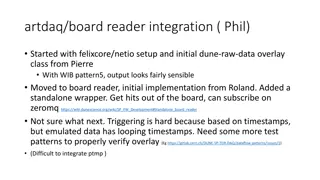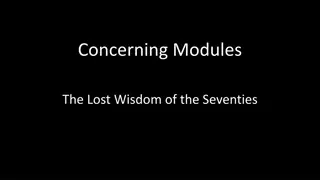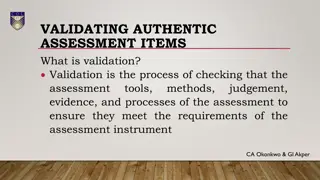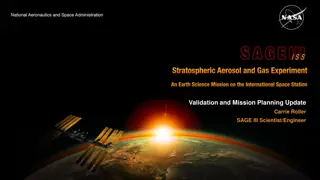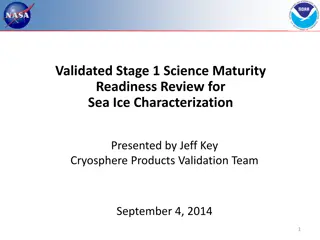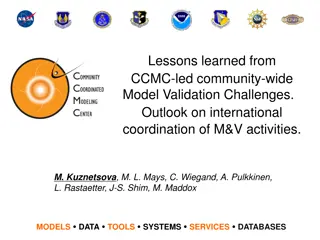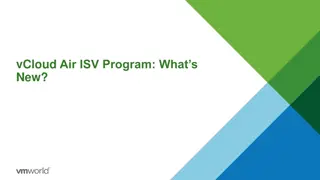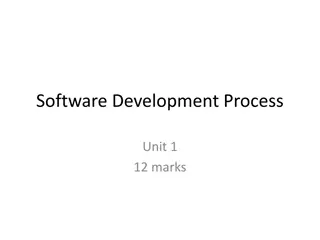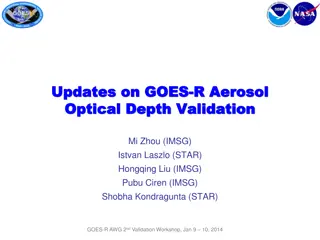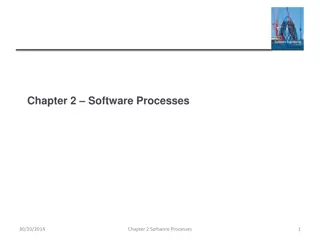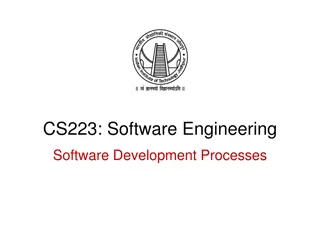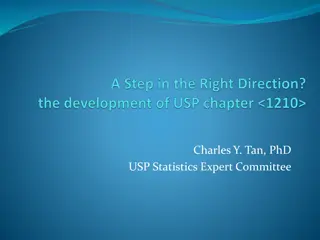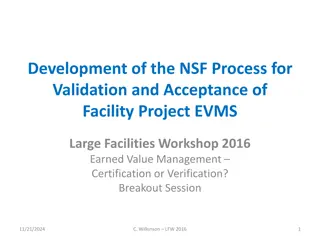Understanding Software Engineering: Concepts and Characteristics
Software engineering involves the application of scientific principles and methods to develop efficient, reliable software products. The need for software engineering arises due to factors like large software size, scalability, cost concerns, dynamic nature, and quality management. Good software exh
1 views • 25 slides
Understanding Evaluation and Validation Methods in Machine Learning
Classification algorithms in machine learning require evaluation to assess their performance. Techniques such as cross-validation and re-sampling help measure classifier accuracy. Multiple validation sets are essential for comparing algorithms effectively. Statistical distribution of errors aids in
0 views • 95 slides
Understanding Software Processes and Models
Software processes are structured activities essential for software system development, involving specification, design, validation, and evolution. Various process models and approaches like the Rational Unified Process and agile methods are discussed, highlighting the importance of adaptability in
1 views • 105 slides
Understanding Software Processes and Models
This lecture discusses software processes, models, and activities involved in requirements engineering, software development, testing, and evolution. It covers topics such as process models, computer-aided software engineering (CASE) technology, software specification, design, validation, and evolut
1 views • 25 slides
Approval and Validation Updates for NR MIMO OTA in 3GPP TSG-RAN.WG4 Meeting
The 3GPP TSG-RAN.WG4 Meeting discussed approval for the NR MIMO OTA workplan, addressed FR2 blocking issues, and emphasized the use of polarized antenna models. Updates were made to the power validation procedure and gNB beams usage criteria for FR1 MIMO OTA channel model validation. Collaboration w
1 views • 8 slides
Principles of Calibration, Validation, and Warehousing in Pharmaceutical Quality Assurance
Calibration and validation are critical processes in maintaining the quality of pharmaceutical products. Validation ensures that processes result in expected outcomes consistently, meeting quality standards. Qualification is an essential part of validation, ensuring that equipment and systems perfor
1 views • 37 slides
Ortho Vision Validation and Operation in RCI
Role of RCI laboratory, analyser requirements, validation process, installation verification, and PQ testing for Ortho Vision system. The RCI laboratory plays a crucial role in various testing processes including blood grouping, antibody ID, and compatibility testing. Validation process includes URS
0 views • 17 slides
Understanding Clinical Validation and DRG Validation in Healthcare
Clinical validation ensures that diagnoses documented in a patient's record align with accepted clinical criteria, while DRG validation focuses on matching hospital-coded information with physician descriptions and patient records. Clinical validation involves a review by clinicians to confirm the p
1 views • 39 slides
NIMAS File Validation Using NIMAC Validation Wizard
Validate all files submitted to the NIMAC with the Validation Wizard before submission. The Validation Wizard ensures well-formed XML, correct image references, and more. Remember not to include the screen capture in the NIMAS file set. Download the Validation Wizard from the Resources page and foll
1 views • 17 slides
Understanding Software Measurement and Metrics in Software Engineering
Software measurement plays a crucial role in assessing the size, quantity, and quality of software products and processes. It involves direct and indirect measurement methods to monitor and improve software quality, predict future outcomes, and manage project budgets and schedules. Software metrics
0 views • 8 slides
Software Cost Estimation in Software Engineering
Software cost estimation in software engineering involves predicting the resources required for a software development process. It includes fundamental estimation questions, software cost components, costing and pricing considerations, software pricing factors, and programmer productivity assessment
0 views • 30 slides
Implementing Data Validation in National Accounts with Eurostat
Eurostat's ESA 2010 Validation Task Force has been instrumental in setting up validation checks, resolving recurrent validation problems, and enhancing the data validation process for National Accounts. The project involves participants from NSIs, Central Banks, and data users, focusing on refining
1 views • 29 slides
ATST Safety Review High-Level Software Overview
This document provides an overview of the high-level software components involved in the ATST Safety Review conducted on 26th January 2011. It includes details on the Telescope Software Control Systems, Observatory Software Control Systems, and Instrument Software Control Systems, along with respons
13 views • 15 slides
GOES-R Airborne Science Validation Field Campaign Overview
The GOES-R field campaign aimed to validate ABI and GLM products post-launch by coordinating the high-altitude NASA ER-2 aircraft with ground-based reference data over various Earth targets from March 21 to May 17, 2017. The primary objective was the independent validation of ABI spectral radiance o
1 views • 11 slides
Understanding Software Engineering: An Overview by Lecturer Sebastian Coope
Explore the world of software engineering with Lecturer Sebastian Coope in this informative module introduction. Discover the importance of structured and disciplined approaches in making software, the challenges in software development, and the necessity of software engineering in handling complex
5 views • 37 slides
Understanding Cross-Validation in Machine Learning
Cross-validation is a crucial technique in machine learning used to evaluate model performance. It involves dividing data into training and validation sets to prevent overfitting and assess predictive accuracy. Mean Squared Error (MSE) and Root Mean Squared Error (RMSE) quantify prediction accuracy,
0 views • 19 slides
Software Testing and Validation Overview
In this comprehensive guide, we delve into various aspects of software testing, including JUnit testing, test cases, verdicts, and exception handling in JUnit. Explore examples, methods, and best practices to enhance your understanding of software testing and validation processes.
0 views • 13 slides
CEOS LPV Fire Disturbance Products Overview
CEOS LPV Fire Disturbance products play a crucial role in monitoring and validating active fire and burned area datasets. The current status highlights the validation protocols in place for reference data generation, product inter-comparisons, and the need for validation information for multiple use
0 views • 9 slides
Snow Cover Validation Workshop 2013 Overview
Snow Cover Validation Workshop in 2013 focused on validating fractional snow cover data from November 1, 2012, to May 31, 2013. The workshop highlighted validation processes, tool statuses, product examples, algorithm enhancements, and post-launch activities. Key findings from granules demonstrated
0 views • 17 slides
Machine Learning Techniques: K-Nearest Neighbour, K-fold Cross Validation, and K-Means Clustering
This lecture covers important machine learning techniques such as K-Nearest Neighbour, K-fold Cross Validation, and K-Means Clustering. It delves into the concepts of Nearest Neighbour method, distance measures, similarity measures, dataset classification using the Iris dataset, and practical applic
1 views • 14 slides
Enhancing NIMAS File Validation with New Validation Wizard
The NIMAC introduced a new validation wizard in early 2022 to streamline the validation process for publishers and vendors. This tool provides advanced file examination, including feedback on OPF metadata and XML tagging errors. Learn how to use the tool efficiently for successful validation output,
0 views • 13 slides
Facilities Information Management System (FIMS) Data Validation Process
This document outlines the validation process for the Facilities Information Management System (FIMS), including objectives, validation team introductions, validation process steps, and the schedule for validation activities. It covers elements such as gauging the robustness of FIMS data, ensuring d
0 views • 18 slides
ESA Validation Approach & Fiducial Reference Measurements Overview
The validation approach outlined by ESA focuses on providing reliable products with documented error bars and enhancing algorithm and sensor quality. A validation program consists of various activities, including validation against precise reference measurements, in-situ validation, inter-satellite
0 views • 8 slides
Staff Data Validation Training 2023-2024 Overview
Learn about the staff data validation process for the 2023-2024 school year conducted by the Oregon Department of Education. Understand the importance of reviewing and verifying staff information for publication in various reports and profiles. Mark your calendar for key validation dates and explore
0 views • 49 slides
Understanding ASP.NET Validators and Validation Controls
ASP.NET validation controls play a crucial role in ensuring that user input data is valid and secure. They help prevent the storage of useless or contradictory data by validating input fields. Key validation controls include RequiredFieldValidator, RangeValidator, CompareValidator, RegularExpression
0 views • 37 slides
Understanding Validation Controls in ASP.NET for Secure Data Input
Explore the significance of validation controls in ASP.NET to prevent user input errors and ensure data security. Learn about the types of validators, server-side vs. client-side validation, key properties, and best practices for implementing secure data validation in your web applications.
0 views • 13 slides
Evolution of Serials Validation Processes at OhioLINK
The evolution of serials validation processes at OhioLINK over the years, from the establishment of high-density storage facilities to the development and refinement of validation policies. The transition from issue-level to volume-level validation, evaluation of efficiencies, and the impact on staf
0 views • 8 slides
Latest Developments in Integration and Validation of Data Flow Systems
The teams led by Phil, Kunal, Raul, and Pieter are working on various aspects of data flow system integration and validation. Progress has been made in implementing, testing, and refining different functionalities such as timestamp management, data conversion, formatting, and software verification.
0 views • 7 slides
Insights from NATO Software Engineering Conferences and The Software Crisis of the Seventies
Exploring the challenges faced in software engineering during the 1970s, including issues such as project delays, inefficiencies, and the critical need for reliable, high-quality software. Insights from the NATO Software Engineering Conferences shed light on the struggle to meet increasing modern so
0 views • 46 slides
Understanding Validation in Authentic Assessment Items
Validation in authentic assessment items is crucial for ensuring the quality and effectiveness of assessment tools. It involves a thorough review process to confirm that the test items are valid, reliable, and produce authentic evidence for making sound judgments. Various aspects of validation, incl
0 views • 29 slides
SAGE III Validation Update: Mission Planning, Partnerships, and Criteria
Carrie Roller, the SAGE III Scientist/Engineer, provides an update on validation and mission planning, including partnerships with NDACC lidar and sonde sites, weekly coordination of SAGE III events with in-situ data, and the criteria for validation using in-situ data such as stratospheric ozone, ae
0 views • 13 slides
Overview of Sea Ice Characterization and Validation Process
Sea ice characterization and validation process for cryosphere products involve three stages of validation maturity. It includes evaluating algorithm performance, analyzing required inputs, conducting quality flag analysis, and documenting error budget. The team members consist of experts from vario
0 views • 38 slides
Insights from CCMC-Led Model Validation Challenges & International Coordination
Explore lessons learned from CCMC-led community-wide model validation challenges, emphasizing the importance of international coordination for monitoring and validation activities in the space weather domain. Discover key elements of model validation, community-wide metrics studies, and operational
0 views • 10 slides
Evolution of vCloud Air ISV Program in 2015
vCloud Air ISV Program underwent significant changes in 2015 with the introduction of automated validation, hybrid certification, streamlined processes, and enhanced technical engagement with VMware. ISV partners can now easily integrate with vCloud Air through the Developer Center, ensuring compati
0 views • 6 slides
Understanding the Essence of Software Development Process
Software is a vital component in today's technology-driven world. It consists of instructions, data structures, and descriptive information that enable the functioning of computer programs. Unlike hardware manufacturing, software development is an engineering process that undergoes changes and deter
0 views • 74 slides
Updates on GOES-R Aerosol Optical Depth Validation Activities
Generated proxy data algorithm enhancements for post-launch validation activities were discussed at the GOES-R AWG 2nd Validation Workshop in January 2014. The use of MODIS reflectances as a proxy for ABI to retrieve Aerosol Optical Depth (AOD) was emphasized, along with the importance of AERONET gr
0 views • 25 slides
Overview of Software Processes and Models
This content delves into the fundamental aspects of software processes, discussing the structured activities involved in developing a software system, various process models, and the distinction between plan-driven and agile approaches. It emphasizes the importance of specification, design, validati
0 views • 37 slides
Understanding Software Engineering and Development Processes
Explore the key concepts of software engineering, including misconceptions, legacy software, and development phases. Learn about professional responsibilities, the need for software processes, the ETVX model, and different properties of software processes. Discover the components of software process
0 views • 57 slides
Statistical Tools for Method Validation in USP General Chapter 1210
In the USP General Chapter 1210, Statistical Tools for Method Validation are outlined, serving as a companion to the validation of Compendial Procedures. The chapter covers important topics like Accuracy, Precision, Linearity, LOD, LOQ, and range. It emphasizes statistical tools such as TOST, statis
0 views • 22 slides
Development of NSF Process for Validation and Acceptance of EVMS: Insights and Recommendations
NSF is enhancing guidelines for Earned Value Management Systems (EVMS) to evaluate construction project status. Insights suggest obtaining certification and validation for maintaining acceptable EVM systems, important for project oversight. Recommendations highlight the need for decisive action to e
0 views • 16 slides
